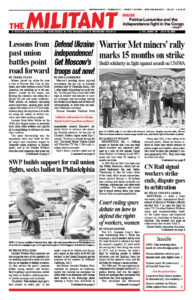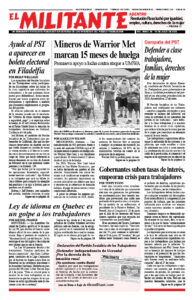July 28, 1997
CORDOBA, Argentina — Since September, the Fiat plant in this city has been the scene of one of the most important labor battles in Argentina in a number of years. The workers are fighting for recognition of their union and resisting the company’s attempt to force major concessions in wages, benefits and working conditions.
Cordoba is the center of the auto and aerospace industry of this South American country. The government of Carlos Menem is pushing to pass a sweeping “labor flexibilization” bill.
The struggle at Fiat reflects moods developing among other industrial workers. “Our fight is part of the struggle against the labor flexibilization bill,” said Carlos Gallo, the main leader of the union activists. “The bosses have already begun to implement it at Renault and Volkswagen, and it will be used against the whole labor movement.”
July 21, 1972
The following expresses the views of Linda Jenness and Andrew Pulley, presidential and vice-presidential candidates of the Socialist Workers Party.
From 1965 to 1972 prices rose by more than 30%, according to the Department of Labor. The following points constitute the program of the SWP for combating rising prices.
1) Cost-of-living, or escalator, clauses in all union contracts so that wages will rise to whatever degree prices rise. The clause should also be applied to Social Security payments, welfare payments, and the minimum wage to alleviate the effect of inflation on those with fixed incomes.
2) Immediate, unconditional withdrawal from Southeast Asia.
3) Roll back all rents to a maximum of 10% of family income.
4) Consumer committees should be elected in each neighborhood to inspect price increases in supermarkets.
July 21, 1947
Eight Negro inmates of a Georgia state prison camp were blasted to death on July 11 in a cold-blooded massacre by race-hating prison guards led by a drink-inflamed warden. Five other prisoners in the all-Negro hell-camp were seriously wounded.
The details of the mass lynching were described by surviving prisoners. William Bell, one of the five wounded, testified that Warden H. G. Worthy was enraged and drunk. Bell, whom guards call the “leader” of the prisoners, said that Worthy called out to him: “Come out, Pee Wee, I want to kill you.” When Bell didn’t move, Worthy shot him in the leg at the same time shouting, “Let ’em have it!”
Fear-stricken by the hail of bullets and shot-gun pellets, the 27 men ran for whatever cover they could find. Thirteen sprawled in their blood on the ground. Five died immediately, three others within three days.

